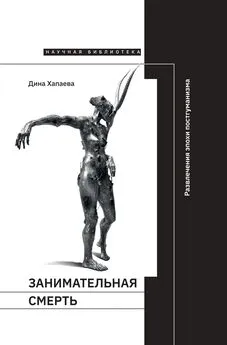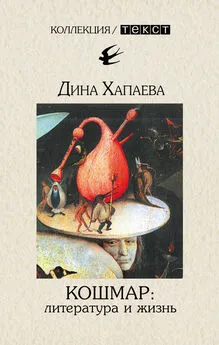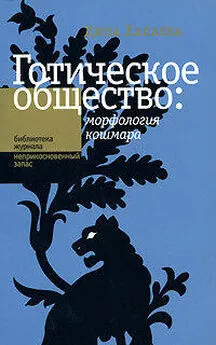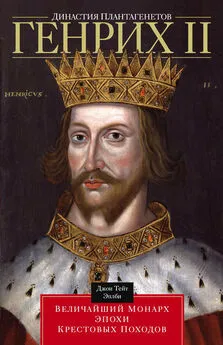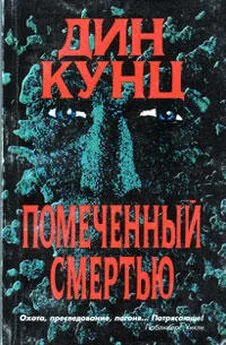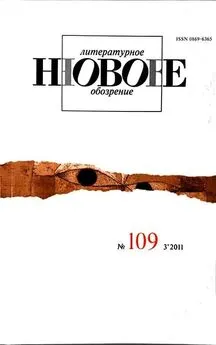Дина Хапаева - Занимательная смерть. Развлечения эпохи постгуманизма
- Название:Занимательная смерть. Развлечения эпохи постгуманизма
- Автор:
- Жанр:
- Издательство:Новое литературное обозрение
- Год:2020
- Город:Москва
- ISBN:978-5-4448-1355-3
- Рейтинг:
- Избранное:Добавить в избранное
-
Отзывы:
-
Ваша оценка:
Дина Хапаева - Занимательная смерть. Развлечения эпохи постгуманизма краткое содержание
Занимательная смерть. Развлечения эпохи постгуманизма - читать онлайн бесплатно ознакомительный отрывок
Интервал:
Закладка:
Khapaeva D. Triumphant Memory of the Perpetrators: Putin’s Politics of Re-Stalinization // Communist and Post-Communist Studies. 2016. 49. P. 61–73.
Khapaeva D., Kopossov N. Les demi-dieux de la mythologie soviétique // Annales: Economies, Sociétés, Civilisations. 1992. 47, nos. 4–5. P. 963–989.
King C. R. (Mis)uses of Cannibalism in Contemporary Cultural Critique // Diacritics. 2000. 30, no. 1. P. 106–123.
Kirsh S. J. Children, Adolescents and Media Violence: A Critical Look at the Research. Thousand Oaks, CA: Sage Publications, 2006.
Klemp A. Evil and the Loss of Identity // Phoenix Rising: Collected Papers on Harry Potter / Ed. by Sh.K. Goetz. Sedalia, CO: Narrate Conferences, 2008. P. 119–120.
Konner M. Sacred Violence, Mimetic Rivalry, and War // Mimesis and Science: Empirical Research on Imitation and the Mimetic Theory of Culture and Religion / Ed. by Scott R. Garrels. East Lansing: Michigan State University Press, 2011. P. 155–174.
Koposov N. L’Univers clos des signes: Vers une histoire du paradigme linguistique // De Russie et d’ailleurs: Mélanges Marc Ferro / Ed. by M. Godet. Paris: Institut d’études slaves, 1995. P. 501–513.
Koselleck R. The Practice of Conceptual History: Timing History, Spacing Concepts. Stanford: Stanford University Press, 2002.
Kübler-Ross E. Questions and Answers on Death and Dying. New York: Macmillan, 1974.
Kumar K. Apocalypse, Millennium and Utopia Today // Apocalypse Theory and the Ends of the Earth, edited by Malcolm Bull. Oxford: Blackwell, 1995.
Kurzweil R. The Singularity Is Near: When Humans Transcend Biology. New York: Viking, 2005.
Lacroix P. Manners, Custom and Dress During the Middle Ages and During the Renaissance Period [1878]. New York: Kessinger Publishing, 2010.
Lane Ch. The Rites of Rulers: Ritual in Industrial Society. Cambridge: Cambridge University Press, 1981.
Laqueur Th. W. The Work of the Dead: A Cultural History of Mortal Remains. Princeton: Princeton University Press, 2015.
Lathey G. The Travels of Harry: International Marketing and the Translation of J. K. Rowling’s Harry Potter Books // The Lion and the Unicorn. 2005. 29, no. 2. P. 141–151.
Latour B. Reassembling the Social: An Introduction to Actor-Network-Theory. Oxford: Oxford University Press, 2005.
Lévi-Strauss C. Structural Anthropology. Translated by Monique Layton. Chicago: University of Chicago Press, 1983.
Lévi-Strauss C. The Savage Mind. Chicago: University of Chicago Press, 1966.
Lipovetsky M. Russian Postmodernist Fiction: Dialogue with Chaos. Armonk, NY: M. E. Sharpe, 1999.
Llored P. Jacques Derrida: Politique et éthique de l’animalité. Paris: Sils Maria, 2012.
Lyotard J. - F. Le Tombeau de l’intellectuel, et autres papiers. Paris: Galilée, 1984.
Lyotard J. - F. The Inhuman: Reflections on Time / Trans. G. Bennington and R. Bowlby. Cambridge: Polity Press, 1991.
Magliocco S. Witching Culture: Folklore and Neo-Paganism in America. Philadelphia: University of Pennsylvania Press, 2004.
Malin I. New American Gothic. Carbondale: Southern Illinois University Press, 1962.
Marchi R. M. Day of the Dead in the USA: The Migration and Transformation of a Cultural Phenomenon. New Brunswick, NJ: Rutgers University Press, 2009.
McCauley C. When Screen Violence Is Not Attractive // Why We Watch / Ed. by J. Goldstein. New York: Oxford University Press, 1998. P. 144–162.
Media and the Apocalypse / Hart, K.-P. R., Holba A. M., eds. New York: Peter Lang, 2009.
Megill A. Prophets of Extremity: Nietzsche, Heidegger, Foucault, Derrida. Berkeley: University of California Press, 1985.
Miah A. A Critical History of Posthumanism // Medical Enhancements & Posthumanity / Ed. by B. Gordijn and R. Chadwick. New York: Routledge, 2007. P. 71–94.
Mighall R. Geography of Victorian Gothic Fiction: Mapping History’s Nightmares. New York: Oxford University Press, 1999.
Miles R. Gothic Writing 1750–1820: A Genealogy, 2nd ed. Manchester: Manchester University Press, 2002.
Mitford J. The American Way of Death (1963). New York: Buccaneer Books, 1993.
Moeller S. D. Compassion Fatigue: How The Media Sell Disease, Famine, War, and Death. New York: Routledge, 1999.
Mongin O. Face au scepticisme: Les mutations du paysage intellectuel (1976–1998). Paris: Hachette, 1998.
Monstrous Adaptations: Generic and Thematic Mutations in Horror Film / Hand R. J., McRoy J., eds. Manchester: Manchester University Press, 2007.
Montillo R. Halloween and Commemorations of the Dead. New York: Infobase Publishing, 2009.
Morton L. Trick or Treat: A History of Halloween. London: Reaktion Books, 2013.
Natov R. The Poetics of Childhood. New York: Routledge, 2012.
Nel Ph. Is There a Text in This Advertising Campaign? Literature, Marketing, and Harry Potter // The Lion and the Unicorn. 2005. 29, no. 2. P. 236–267.
Nietzsche F. «On the Genealogy of Morality» and Other Writings / Ed. by A.-P. Keith. Trans. by C. Diethe. Cambridge: Cambridge University Press, 2007.
Nikolaejeva M. Harry Potter and the Secrets of Children’s Literature // Critical Perspectives on Harry Potter / Ed. by E. E. Heilman. New York: Taylor & Francis, 2008. P. 230–245.
Noctor C. Putting Harry Potter on the Couch // Clinical Child Psychology and Psychiatry. 2006. no. 11. P. 579–589.
Nora P. L’Ère de la commemoration // Les Lieux de mémoire, vol. III / Ed. by P. Nora. Paris: Gallimard, 1992. P. 346–393.
Norris Ch. Derrida. Cambridge, MA: Harvard University Press, 1987.
Nussbaum M. Mortal Immortals: Lucretius on Death and the Voice of Nature // Philosophy and Phenomenological Research. 1989. No. 50. P. 303–351.
Paglia C. Vamps & Tramps: New Essays. New York: Knopf Doubleday, 2011.
Paik P. Y. From Utopia to Apocalypse: Science Fiction and the Politics of Catastrophe. Minneapolis: University of Minnesota Press, 2010.
Parasecoli F. Bite Me: Food in Popular Culture. Oxford: Berg Publishers, 2008.
Parkes C. M. Conclusions II: Attachments and Losses in Cross-Cultural Perspectives // Death and Bereavement Across Cultures / Ed. by C. M. Parkes, P. Laungani, W. Young. London: Routledge, 2003.
Patrick C. J., Patrick S. K. Exploring the Dark Side: Harry Potter and the Psychology of Evil // The Psychology of Harry Potter: An Unauthorized Examination of the Boy Who Lived / Ed. by N. Mulholland. New York: Smart Pop Books, 2007. P. 210–225.
Pennington J. From Elfland to Hogwarts, or the Aesthetic Trouble with Harry Potter // The Lion and the Unicorn. 2002. 26, no. 1. P. 78–97.
Platt K. M. F. History in a Grotesque Key: Russian Literature and the Idea of Revolution Stanford: Stanford University Press, 1997.
Plumwood V. Tasteless: Towards a Food- Based Approach to Death // Environmental Values. 2008. 17, no. 3.
Punter D. The Literature of Terror: A History of Gothic Fictions from 1765 to the Present Day, 2 vols. Harlow, Essex: Longman, 1996.
Punter D. , Byron G. The Gothic. London: Wiley, 2004.
Renner K. J. Evil Children in Film and Literature // The «Evil Child» in Literature, Film and Popular Culture / Ed. by K. J. Renner. New York: Routledge, 2013.
Rogers N. Halloween: From Pagan Ritual to Party Night. Oxford: Oxford University Press, 2002.
Rorty R. Moral Identity and Private Autonomy: The Case of Foucault // Essays on Heidegger and Others: Philosophical Papers, vol. 2. Cambridge: Cambridge University Press, 1991. P. 193–198.
Santino J. Introduction: Festivals of Life and Death // Halloween and Other Festivals of Death and Life, edited by Jack Santino. Knoxville: University of Tennessee Press, 1994.
Sax B. Animals in the Third Reich: Pets, Scapegoats, and the Holocaust. London: A & C Black Publishers, 2000.
Schaeffer J. - M. La Fin de l’exception humaine. Paris: Seuil, 2007.
Schmid D. Natural Born Celebrities: Serial Killers in American Culture. Chicago: University of Chicago Press, 2005.
Senf C. Bram Stoker. Cardiff: University of Wales Press, 2010.
Sewell W. H. Logics of History: Social Theory and Social Transformation. Chicago: University of Chicago Press, 2005.
Shea B. To Bite or Not to Bite: Twilight, Immortality and the Meaning of Life // Twilight and Philosophy: Vampires, Vegetarians, and the Pursuit of Immortality / Ed. by R. Housel, J. J. Wisnewski, W. Irwin. Hoboken, NJ: John Wiley & Sons, 2009. P. 79–93.
Shillabeer R. The Fascination with Torture and Death in Twenty-First-Century Crime Fiction // The Power of Death: Contemporary Reflections on Death in Western Society / Ed. by M.-J. Blanco and R. Vidal. New York: Berghahn Books, 2014. P. 102–115.
Shippey T. A. The Road to Middle- Earth: How J. R. R. Tolkien Created a New Mythology. New York: HarperCollins, 2005.
Simpson Ph. Psycho Paths: Tracking the Serial Killer Through Contemporary American Film and Fiction. Carbondale: Southern Illinois University Press, 2000.
Singer P. Animal Liberation: A New Ethics for our Treatment of Animals. New York: Random House, 1975.
Singer P. Rethinking Life and Death: The Collapse of Our Traditional Ethics. Melbourne: Text Publishing, 1994.
Skal D. J. Death Makes a Holiday: A Cultural History of Halloween. New York: Bloomsbury USA, 2002.
Slocum J., Carlso L. Final Rights: Reclaiming the American Way of Death. Hinesburg, VT: Upper Access Books, 2011.
Sobchack V. Carnal Thoughts: Embodiment and Moving Image Culture. Berkeley: University of California Press, 2004.
Spiegel G. M. The Past as Text: The Theory and Practice of Medieval Historiography. Baltimore: Johns Hopkins University Press, 1997.
Suny R. G. The Soviet Experiment: Russia, the USSR, and the Successor States. New York: Oxford University Press, 1998.
Taub D. J., Heather L. S. - S. Controversial Content: Is Harry Potter Harmful to Children? // Critical Perspectives on Harry Potter / Ed. by E. E. Heilman. New York: Taylor & Francis, 2008. P. 13–32.
The Darker Side of Travel: The Theory and Practice of Dark Tourism / R. Sharpley, Ph.R. Stone, eds. Bristol: Channel View Publications, 2009.
The Social Construction of Death: Interdisciplinary Perspective / Van Brussel L., Carpentier N. eds. London: Palgrave, 2014.
Todorov Tz. The Fantastic: A Structural Approach to a Literary Genre / Trans. by R. Howard Cleveland, OH: Case Western Reserve University Press, 1973.
Tumarkin N. Lenin Lives: The Lenin Cult in Soviet Russia. Cambridge, MA: Harvard University Press, 1983.
Understanding Dying, Death, and Bereavement / M. R. Leming, G. E. Dickinson, eds. 6th ed. Belmont, CA: Thomson Publishing, 2007.
Vanderstraeten R. Burying and Remembering the Dead // Memory Studies. 2014. 7, no. 4. P. 457–471.
Vardy P. Dead Reckoning // The Times Higher Education Supplement. 2011. August 18.
Vidal R. Death and Visual Culture // The Power of Death: Contemporary Reflections on Death in Western Society / Ed. by M.-J. Blanco and R. Vidal. New York: Berghahn Books, 2014. P. 115–126.
Читать дальшеИнтервал:
Закладка:
